外研英语八年级下Module 3 Journey to space .Unit 2 We have not found life on any other planets yet(共66张PPT)
文档属性
| 名称 | 外研英语八年级下Module 3 Journey to space .Unit 2 We have not found life on any other planets yet(共66张PPT) | 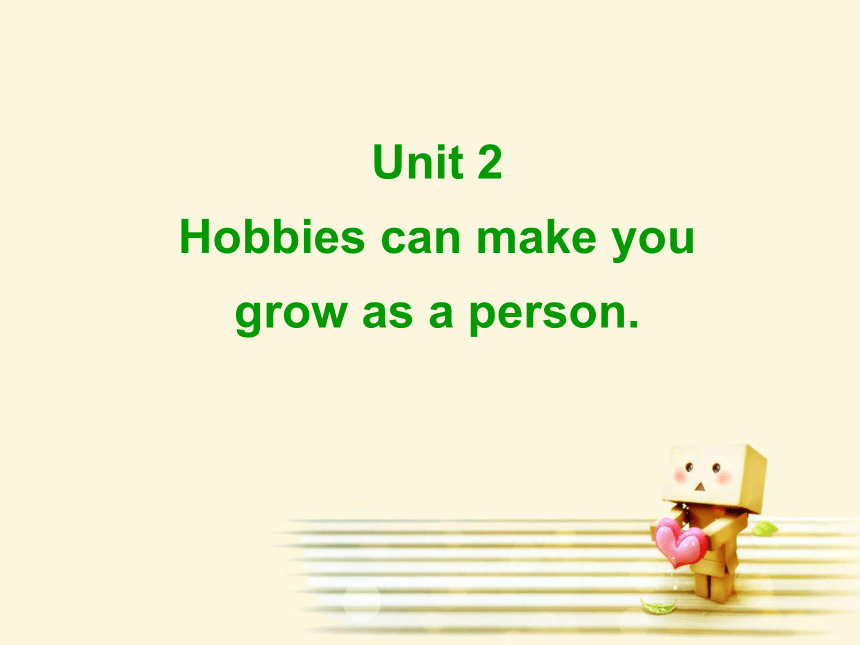 | |
| 格式 | zip | ||
| 文件大小 | 2.1MB | ||
| 资源类型 | 教案 | ||
| 版本资源 | 外研版 | ||
| 科目 | 英语 | ||
| 更新时间 | 2020-04-28 13:33:13 | ||
图片预览

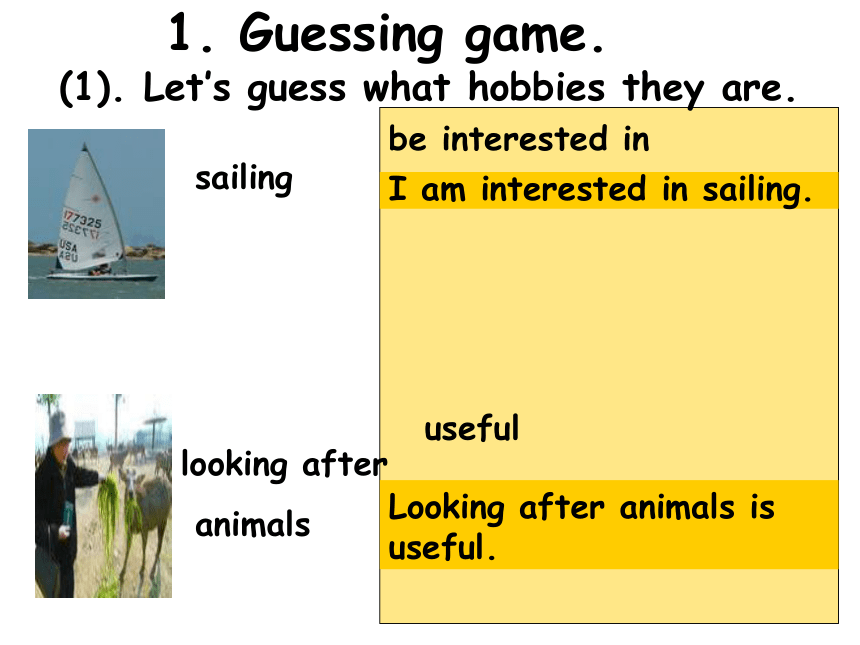
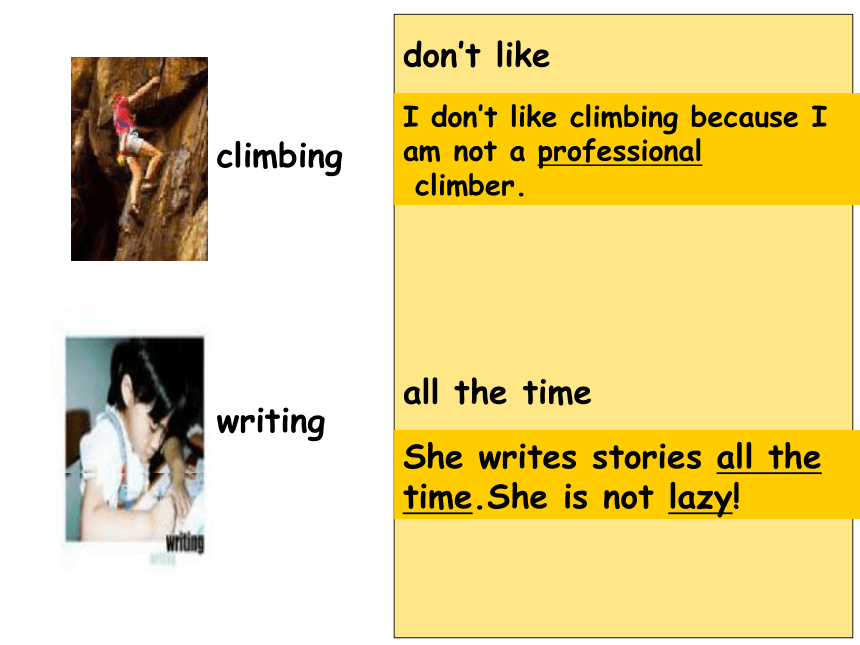
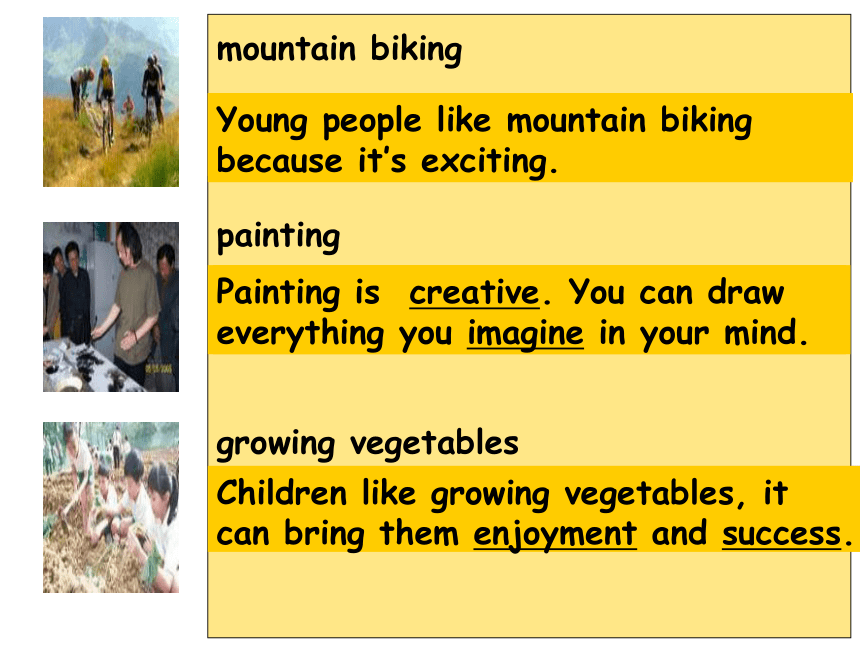

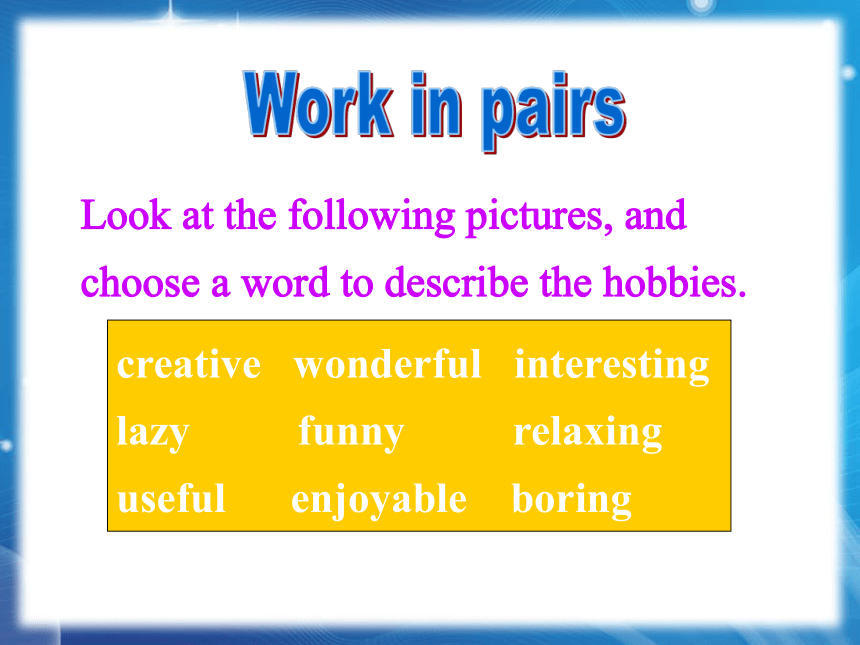
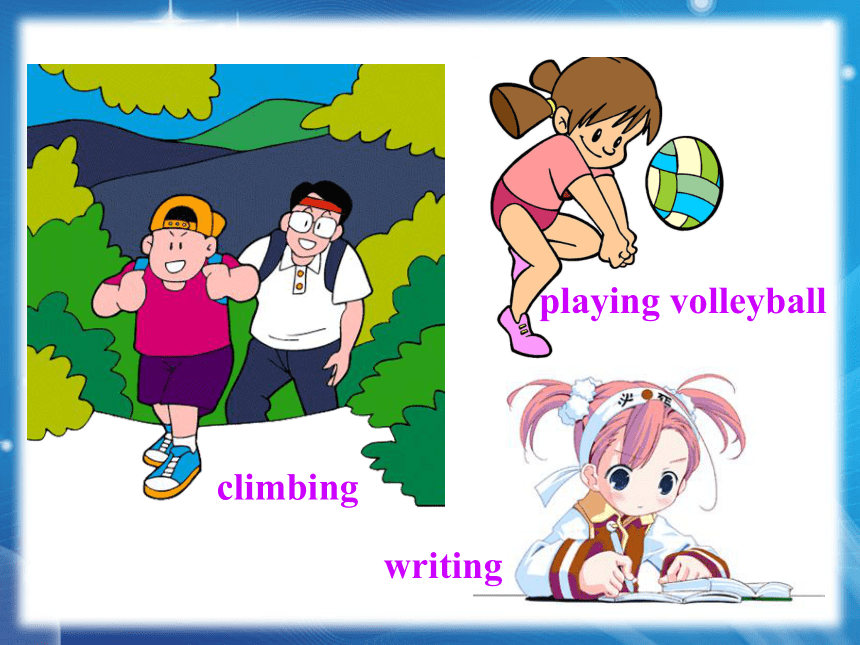

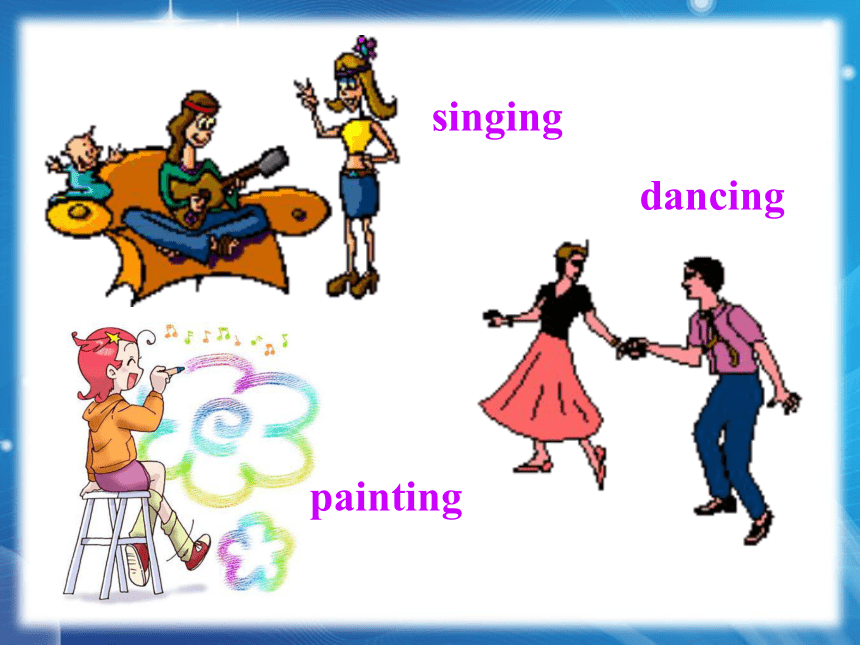
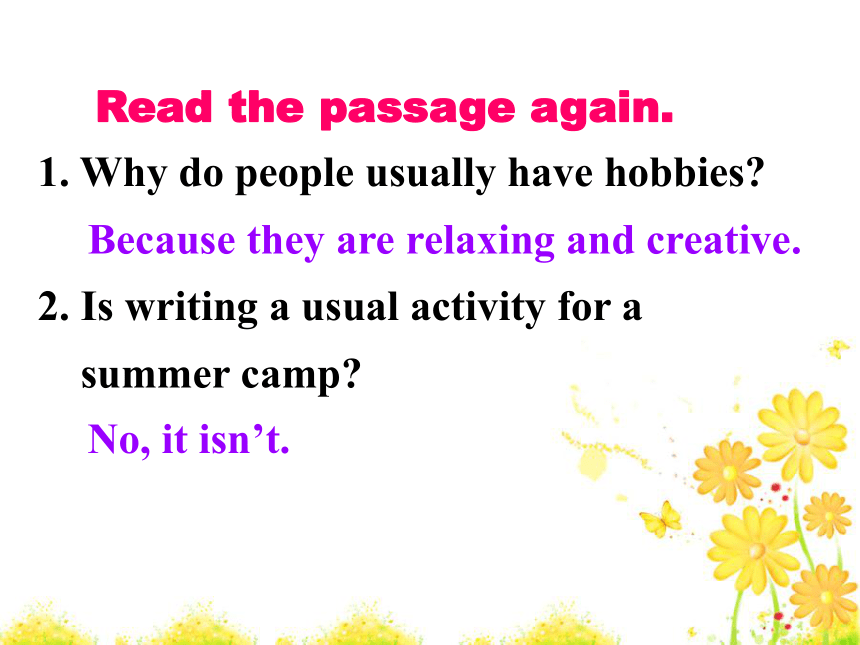
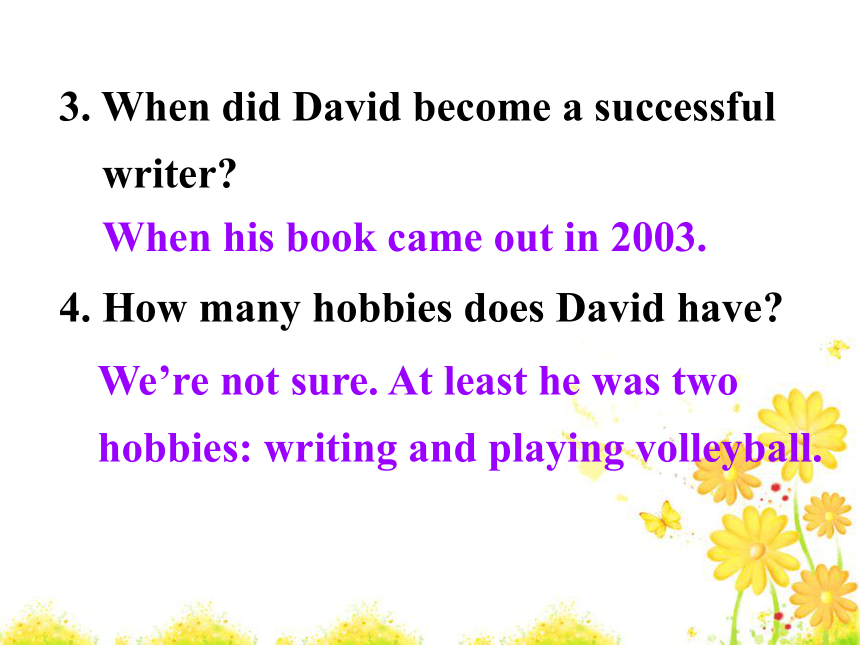
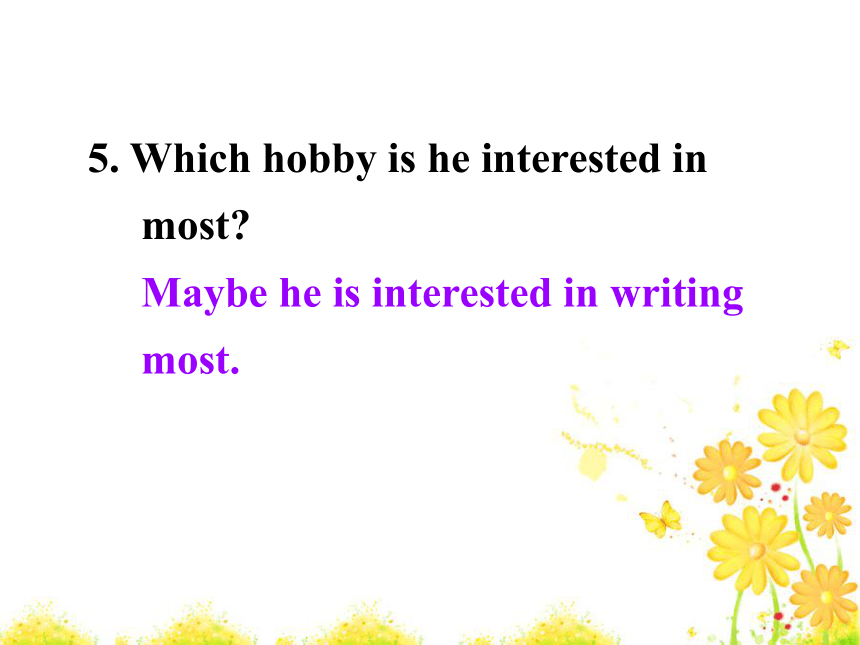
文档简介
课件66张PPT。Unit 2
Hobbies can make you grow as a person.1. Guessing game.(1). Let’s guess what hobbies they are.looking after
animalsI am interested in sailing.be interested inusefulLooking after animals is useful.sailingclimbingdon’t likewritingall the timeI don’t like climbing because I am not a professional
climber.She writes stories all the time.She is not lazy!mountain bikingYoung people painting creative growing vegetablesChildren like growing vegetables, it can bring them enjoyment and success.Young people like mountain biking because it’s exciting.Painting is creative. You can draw everything you imagine in your mind.(2) Let’s talk about the hobbies.12345678910My hobby is …
It’s…creative interesting lazy relaxing useful
mountain biking
climbing
sailing
playing volleyball
dancing
Looking after animals
painting
growing vegetables
writing
singing
Look at the following pictures, and choose a word to describe the hobbies.creative wonderful interesting lazy funny relaxing useful enjoyable boringWork in pairsclimbingplaying volleyball writing sailinglooking after
animalsmountain bikinggrowing vegetablessingingpaintingdancing Read the passage again.
1. Why do people usually have hobbies?
2. Is writing a usual activity for a
summer camp?Because they are relaxing and creative.No, it isn’t.3. When did David become a successful
writer?
4. How many hobbies does David have?When his book came out in 2003.We’re not sure. At least he was two
hobbies: writing and playing volleyball.5. Which hobby is he interested in
most?
Maybe he is interested in writing
most.(4). Language points.1. Many students have hobbies such as …
2. Hobbies can make you grow as a person,
develop your interests and help you learn
new …
3. As well as the usual activities, …
4. She asked us to imagine that we were in
a story.
such as: 比如、例如make you grow as a person: 使你健全成长As well as: 和…一样imagine that we were in a story:设想我们在
故事之中
5. David wrote a story about teenage life, and it came out…
…, and as a result, David has …
7.I spend some of my free time playing volleyball…
8.Maybe I’ll write more books in the future, but I’m not surecame out: 出版as a result:作为结果spend …(in) doing: 花时间做maybe: 也许、大概(4). Language points.1. Many students have hobbies such as …
2. Hobbies can make you grow as a person,
develop your interests and help you learn
new …
3. As well as the usual activities, …
4. She asked us to imagine that we were in
a story.
such as: 比如、例如make you grow as a person: 使你健全成长As well as: 和…一样imagine that we were in a story:设想我们在
故事之中
5. David wrote a story about teenage life, and it came out…
…, and as a result, David has …
7.I spend some of my free time playing volleyball…
8.Maybe I’ll write more books in the future, but I’m not surecame out: 出版as a result:作为结果spend …(in) doing: 花时间做maybe: 也许、大概1. Many students have hobbies, such as
reading…and looking after animals.
1) such as “例如”, 用于列举前面概述过的事物, 不需要用逗号与其它成分隔开。such as 后面跟所列举的名词, 代词或V-ing。 e.g. The shop is selling many things,
_____ school things, food and toys.
A. for example B. such as
C. like D. Both B and Csuch as和for example都有“例如”之意,都可用来举例, 但用法有所不同。
* such as常用来列举同类人或事物中 的 多个例子。
e.g. I like fruits, such as apples, pears and bananas. 我喜欢吃水果, 例如 苹果、梨和香蕉。* for example一般只以同类人或事物中的“一个”为例, 作插入语, 用逗号隔开, 可置于句首、句中或句末。
e.g. For example, London is the capital
of England.
例如, 伦敦是英国的首都。2) look after: take care of 照顾;照看
常用 look after sb./sth.
e.g. His mother has been ill for a long
time. He has to ______ at home.
A. look at her B. look her after
C. look for her D. look after her 2. Hobbies can make you grow as a person,
develop your interests and help you
learn new skills.
爱好可以使你们成长,培养你们的兴
趣,并帮助你们学习新的技能。1) make sb. do sth. “使某人做某事”
Sad movies always make me ____. A. to cry B. crying C. cry D. cried
2) as: prep. “作为”
He began to teach in that school ____ a math teacher in 2000. A. at B. as C. in D. on3) interests --- 在此为可数名词指不同的“爱好”。interest 用作不可数名词时“兴趣”, 用作动词是“使(人)发生兴趣”。
interesting---- 事物本身使人产生兴趣
interested ---- 某人对某事感兴趣e.g. This book is very ___ and I am
___ in it.
A. interest; interest
B. interesting; interested
C. interested; interesting
D. interested; interested 4) help sb. (to) do sth. 帮助某人做某事
help sb. with sth. 在某方面帮助某人
help oneself (to sth.) 自用/自取(某物)
can’t help doing sth. 情不自禁地做某事
with one’s help 在……的帮助下e.g. Can you help me to learn English ?
Help yourself to the fish.
With the help of her, he found his lost
child.
Can you help him with this work?3. During the summer of 2000, he spent four weeks on a summer camp.
1) during “在……时间内, 在……期间”
e.g. Some supermarkets open __ 8:30 a.m. and 8:00 pm. ___ the Mid-Autumn Day. A. at, during B. between, during C. between, in D. about, in2) spend, take, pay 和cost 都表示“花费”,用法上区别如下:
* It takes/took sb. + some time + to do sth.
* sb. spend + some time/money + (in) doing / on sth.
* sb. pay + some money + for sth.
* sth. cost (sb.) + some money--- What a beautiful sweater! How
much did you ___ for it?
--- 198 yuan.
A. take B. cost
C. pay D. spend4. As well as the usual activities, …
as well as “ 和; 及; 既…又; 除……以外还;” 并列连词, 用来连接并列成分。
连接并列主语时, 谓语动词与前一主语保持一致。
e.g. He as well as his friends likes singing.辨析:as well as /not only… but also…
* not only A but also B
“不但A,而且B”, 强调B
* A as well as B
“不但B, 而且A”, 强调A e.g. The teacher as well as the students
is coming to see you.
Not only the teacher but also the
students are coming to see you.1. 这个女孩既健康又活泼。
The girl is lively ________ healthy.
2. Daniel plays chess _____, if not
better than, David.
A. as well B. as well as
C. so well D. so well as as well asas… as…
像/和…… 一样; 如同Practice5. She asked us to imagine that we were in a story.
1) ask sb. (not) to do sth. 某人(不)做某事
2) imagine (v.) “想象”
后接名词或代词作宾语
e.g. Can you imagine life without TV or
Internet? imagine 后接动词时, 动词用V-ing 形式。
e.g. Don’t imagine playing in the game.
Can you imagine him cooking in the
kitchen?
imagine sb. to be / as…
e.g. You just imagine him to be a great
actor like Jacket Chan.6. …, and as a result, David has become a successful young writer.
1) as a result --- 介词短语, “作为结果”, 常用在有上下文(表示原因) 的情况下, 一般放句首, 后面加逗号。
e.g. He works hard, as a result, he got a good mark in the exam.2) become ---- “成为; 变得”
e.g. He ________ quite a famous person when he was twenty.
A. was being B. became
C. was becoming D. made7. … his hobby has brought him enjoyment and success.
他的爱好给他带来了快乐和成功。
1) enjoy v. 常用 enjoy + (doing) sth.
enjoyable adj. enjoyment n. [U]
get enjoyment from 从……得到快乐2) success --- n. 成功
succeed --- v. 成功,办妥
successful --- adj. 成功的,胜利的
successfully ---adv. 顺利地,成功地8. Maybe I’ll write more books in the
future, but I’m not sure.
maybe与 may be的区别
maybe作副词意为“也许;可能;大概”; 作
状语时常置于句首。而may be中, may是
情态动词, be是动词原形, 两者构成完整
的谓语形式。有时二者表述的意思相同。e.g. Maybe she’ll come this afternoon. 她可能今天下午来。
He may be in the office.
= Maybe he is in the office.
他或许在办公室。2) in the future与 in future的区别
in the future “将来;未来” 。指将来的某一时间, 但不一定是从现在就立即开始。
in future “今后; 从此以后” 。 指从说话时开始的全部将来时间。用maybe, may be, in the future, in future 填空。
--- What do you want to be ___________? --- I’m not sure. ______ an English
teacher.in the futureMaybePractice9. It’s sometimes difficult to remember that we shouldn’t spend all our time on our favourite hobby.
我们不应该把所有的时间都花在我们
喜欢的爱好上, 但要记住这一点有时很困难。1) It’s + adj. +( for sb.)+ to do sth.
e.g. It’s important _____ us _____ improve our English.
A. to; to B. for; for C. to; for D. for; to2) sometime “ 有朝一日; 在某时”, 指将来或过去的一个不确当的时间。
sometimes “有时”, 频度副词, 用于现在或过去时态中。
some times “数次”
some time “一段时间” I hope to visit the USA ___ in the future.
A. sometimes B. some times
C. sometime D. some time10. There are many other interesting things to do in life, and we should try to do something new or different.
复习: 1) There be … to do
2) something new
3) try to do sth. try doing sth.
try one’s best to do. try on.Answer the questions about the words in the box.Work in pairs free time skill success1. What do you like to do in your free
time?
2. Which new skills have you learnt
through your hobbies?
3. Have any of your hobbies brought
you great success?Discussion1. What do you think of high school
students writing books?
2. Do you think David should write some
more books in the future? Why or why
not?
3. What can a successful hobby mean to a
high school student?Rewrite the sentences in Activity 6.
Answers:
1. ________________________________
________________________________
2. ________________________________
________________________________Some hobbies, such as reading and painting, are very relaxing.David likes writing as well as playing volleyball.3. ________________________________
________________________________
________________________________
4. ________________________________
________________________________He has become a successful writer; as a result, his hobby has brought him enjoyment and success.Many teenagers enjoy sport, such as football and basketball.Work in groups and ask each other the questions about his/her hobby. Write up your notes as full sentences, and write a short passage called“ My classmate’s hobby”. Use as well as, such as or as a result.WritingMy classmate’s hobby
My friend Paul plays chess. His father taught him to play when he was only five years old, and as a result, he is very good at it now. He has played in the school team as well as in national competition. Possible exampleBut Paul is not just a chess player. He
enjoys outdoor activities, such as walking
in the countryside and climbing.Exercises1. I learned some life ____ this winter holiday.
2. Sally often goes ________ with her family in summer.请用所给单词的适当形式填空。lazy, imagine, skill, develop, campcampingskills3. Our city is __________ faster and faster.
4. You can’t _______ how beautiful the park is.
5. Jack is _____ than me. He never washes clothes by himself.lazier developingimagine1. 我经常帮妈妈干家务活, 比如扫地和做饭。
I often help my mother with housework, _______ sweeping the floor and _______ meals.请根据汉语句子完成下列英语句子, 每空一词。cooking such as2. 周杰伦已经成为一位成功的歌手。
许多青少年都喜欢他。
Jay Chou has become a _________ singer. Many ________ like him.
3. 他的一部分业余时间用来和朋友们踢足球。
He spends some of his _____________ football with his friends.free time playingsuccessfulteenagers4. 埃玛既喜欢唱歌也喜欢写作。 Emma likes singing ________ writing.
5. 我们可以从互联网上获得许多有用的信息。
We can get a lot of _______________ from the Internet.useful information as well as1. Tony feels happy today. (改为否定句)
2. I lived in Beijing last year.
(对划线部分提问)请根据各题后括号内的要求改写下列句子。Tony doesn’t feel happy today.
When did you live in Beijing?3. I bought a doll for my sister yesterday.
(对划线部分提问)
4. Can you show me your photos?
(改为同义句) What did you buy for your sister yesterday?
Can you show your photos to me? 5. There is a desk and some chairs in the room. (改为一般疑问句)Is there a desk and some chairs in the room? Thank you for listening!
Hobbies can make you grow as a person.1. Guessing game.(1). Let’s guess what hobbies they are.looking after
animalsI am interested in sailing.be interested inusefulLooking after animals is useful.sailingclimbingdon’t likewritingall the timeI don’t like climbing because I am not a professional
climber.She writes stories all the time.She is not lazy!mountain bikingYoung people painting creative growing vegetablesChildren like growing vegetables, it can bring them enjoyment and success.Young people like mountain biking because it’s exciting.Painting is creative. You can draw everything you imagine in your mind.(2) Let’s talk about the hobbies.12345678910My hobby is …
It’s…creative interesting lazy relaxing useful
mountain biking
climbing
sailing
playing volleyball
dancing
Looking after animals
painting
growing vegetables
writing
singing
Look at the following pictures, and choose a word to describe the hobbies.creative wonderful interesting lazy funny relaxing useful enjoyable boringWork in pairsclimbingplaying volleyball writing sailinglooking after
animalsmountain bikinggrowing vegetablessingingpaintingdancing Read the passage again.
1. Why do people usually have hobbies?
2. Is writing a usual activity for a
summer camp?Because they are relaxing and creative.No, it isn’t.3. When did David become a successful
writer?
4. How many hobbies does David have?When his book came out in 2003.We’re not sure. At least he was two
hobbies: writing and playing volleyball.5. Which hobby is he interested in
most?
Maybe he is interested in writing
most.(4). Language points.1. Many students have hobbies such as …
2. Hobbies can make you grow as a person,
develop your interests and help you learn
new …
3. As well as the usual activities, …
4. She asked us to imagine that we were in
a story.
such as: 比如、例如make you grow as a person: 使你健全成长As well as: 和…一样imagine that we were in a story:设想我们在
故事之中
5. David wrote a story about teenage life, and it came out…
…, and as a result, David has …
7.I spend some of my free time playing volleyball…
8.Maybe I’ll write more books in the future, but I’m not surecame out: 出版as a result:作为结果spend …(in) doing: 花时间做maybe: 也许、大概(4). Language points.1. Many students have hobbies such as …
2. Hobbies can make you grow as a person,
develop your interests and help you learn
new …
3. As well as the usual activities, …
4. She asked us to imagine that we were in
a story.
such as: 比如、例如make you grow as a person: 使你健全成长As well as: 和…一样imagine that we were in a story:设想我们在
故事之中
5. David wrote a story about teenage life, and it came out…
…, and as a result, David has …
7.I spend some of my free time playing volleyball…
8.Maybe I’ll write more books in the future, but I’m not surecame out: 出版as a result:作为结果spend …(in) doing: 花时间做maybe: 也许、大概1. Many students have hobbies, such as
reading…and looking after animals.
1) such as “例如”, 用于列举前面概述过的事物, 不需要用逗号与其它成分隔开。such as 后面跟所列举的名词, 代词或V-ing。 e.g. The shop is selling many things,
_____ school things, food and toys.
A. for example B. such as
C. like D. Both B and Csuch as和for example都有“例如”之意,都可用来举例, 但用法有所不同。
* such as常用来列举同类人或事物中 的 多个例子。
e.g. I like fruits, such as apples, pears and bananas. 我喜欢吃水果, 例如 苹果、梨和香蕉。* for example一般只以同类人或事物中的“一个”为例, 作插入语, 用逗号隔开, 可置于句首、句中或句末。
e.g. For example, London is the capital
of England.
例如, 伦敦是英国的首都。2) look after: take care of 照顾;照看
常用 look after sb./sth.
e.g. His mother has been ill for a long
time. He has to ______ at home.
A. look at her B. look her after
C. look for her D. look after her 2. Hobbies can make you grow as a person,
develop your interests and help you
learn new skills.
爱好可以使你们成长,培养你们的兴
趣,并帮助你们学习新的技能。1) make sb. do sth. “使某人做某事”
Sad movies always make me ____. A. to cry B. crying C. cry D. cried
2) as: prep. “作为”
He began to teach in that school ____ a math teacher in 2000. A. at B. as C. in D. on3) interests --- 在此为可数名词指不同的“爱好”。interest 用作不可数名词时“兴趣”, 用作动词是“使(人)发生兴趣”。
interesting---- 事物本身使人产生兴趣
interested ---- 某人对某事感兴趣e.g. This book is very ___ and I am
___ in it.
A. interest; interest
B. interesting; interested
C. interested; interesting
D. interested; interested 4) help sb. (to) do sth. 帮助某人做某事
help sb. with sth. 在某方面帮助某人
help oneself (to sth.) 自用/自取(某物)
can’t help doing sth. 情不自禁地做某事
with one’s help 在……的帮助下e.g. Can you help me to learn English ?
Help yourself to the fish.
With the help of her, he found his lost
child.
Can you help him with this work?3. During the summer of 2000, he spent four weeks on a summer camp.
1) during “在……时间内, 在……期间”
e.g. Some supermarkets open __ 8:30 a.m. and 8:00 pm. ___ the Mid-Autumn Day. A. at, during B. between, during C. between, in D. about, in2) spend, take, pay 和cost 都表示“花费”,用法上区别如下:
* It takes/took sb. + some time + to do sth.
* sb. spend + some time/money + (in) doing / on sth.
* sb. pay + some money + for sth.
* sth. cost (sb.) + some money--- What a beautiful sweater! How
much did you ___ for it?
--- 198 yuan.
A. take B. cost
C. pay D. spend4. As well as the usual activities, …
as well as “ 和; 及; 既…又; 除……以外还;” 并列连词, 用来连接并列成分。
连接并列主语时, 谓语动词与前一主语保持一致。
e.g. He as well as his friends likes singing.辨析:as well as /not only… but also…
* not only A but also B
“不但A,而且B”, 强调B
* A as well as B
“不但B, 而且A”, 强调A e.g. The teacher as well as the students
is coming to see you.
Not only the teacher but also the
students are coming to see you.1. 这个女孩既健康又活泼。
The girl is lively ________ healthy.
2. Daniel plays chess _____, if not
better than, David.
A. as well B. as well as
C. so well D. so well as as well asas… as…
像/和…… 一样; 如同Practice5. She asked us to imagine that we were in a story.
1) ask sb. (not) to do sth. 某人(不)做某事
2) imagine (v.) “想象”
后接名词或代词作宾语
e.g. Can you imagine life without TV or
Internet? imagine 后接动词时, 动词用V-ing 形式。
e.g. Don’t imagine playing in the game.
Can you imagine him cooking in the
kitchen?
imagine sb. to be / as…
e.g. You just imagine him to be a great
actor like Jacket Chan.6. …, and as a result, David has become a successful young writer.
1) as a result --- 介词短语, “作为结果”, 常用在有上下文(表示原因) 的情况下, 一般放句首, 后面加逗号。
e.g. He works hard, as a result, he got a good mark in the exam.2) become ---- “成为; 变得”
e.g. He ________ quite a famous person when he was twenty.
A. was being B. became
C. was becoming D. made7. … his hobby has brought him enjoyment and success.
他的爱好给他带来了快乐和成功。
1) enjoy v. 常用 enjoy + (doing) sth.
enjoyable adj. enjoyment n. [U]
get enjoyment from 从……得到快乐2) success --- n. 成功
succeed --- v. 成功,办妥
successful --- adj. 成功的,胜利的
successfully ---adv. 顺利地,成功地8. Maybe I’ll write more books in the
future, but I’m not sure.
maybe与 may be的区别
maybe作副词意为“也许;可能;大概”; 作
状语时常置于句首。而may be中, may是
情态动词, be是动词原形, 两者构成完整
的谓语形式。有时二者表述的意思相同。e.g. Maybe she’ll come this afternoon. 她可能今天下午来。
He may be in the office.
= Maybe he is in the office.
他或许在办公室。2) in the future与 in future的区别
in the future “将来;未来” 。指将来的某一时间, 但不一定是从现在就立即开始。
in future “今后; 从此以后” 。 指从说话时开始的全部将来时间。用maybe, may be, in the future, in future 填空。
--- What do you want to be ___________? --- I’m not sure. ______ an English
teacher.in the futureMaybePractice9. It’s sometimes difficult to remember that we shouldn’t spend all our time on our favourite hobby.
我们不应该把所有的时间都花在我们
喜欢的爱好上, 但要记住这一点有时很困难。1) It’s + adj. +( for sb.)+ to do sth.
e.g. It’s important _____ us _____ improve our English.
A. to; to B. for; for C. to; for D. for; to2) sometime “ 有朝一日; 在某时”, 指将来或过去的一个不确当的时间。
sometimes “有时”, 频度副词, 用于现在或过去时态中。
some times “数次”
some time “一段时间” I hope to visit the USA ___ in the future.
A. sometimes B. some times
C. sometime D. some time10. There are many other interesting things to do in life, and we should try to do something new or different.
复习: 1) There be … to do
2) something new
3) try to do sth. try doing sth.
try one’s best to do. try on.Answer the questions about the words in the box.Work in pairs free time skill success1. What do you like to do in your free
time?
2. Which new skills have you learnt
through your hobbies?
3. Have any of your hobbies brought
you great success?Discussion1. What do you think of high school
students writing books?
2. Do you think David should write some
more books in the future? Why or why
not?
3. What can a successful hobby mean to a
high school student?Rewrite the sentences in Activity 6.
Answers:
1. ________________________________
________________________________
2. ________________________________
________________________________Some hobbies, such as reading and painting, are very relaxing.David likes writing as well as playing volleyball.3. ________________________________
________________________________
________________________________
4. ________________________________
________________________________He has become a successful writer; as a result, his hobby has brought him enjoyment and success.Many teenagers enjoy sport, such as football and basketball.Work in groups and ask each other the questions about his/her hobby. Write up your notes as full sentences, and write a short passage called“ My classmate’s hobby”. Use as well as, such as or as a result.WritingMy classmate’s hobby
My friend Paul plays chess. His father taught him to play when he was only five years old, and as a result, he is very good at it now. He has played in the school team as well as in national competition. Possible exampleBut Paul is not just a chess player. He
enjoys outdoor activities, such as walking
in the countryside and climbing.Exercises1. I learned some life ____ this winter holiday.
2. Sally often goes ________ with her family in summer.请用所给单词的适当形式填空。lazy, imagine, skill, develop, campcampingskills3. Our city is __________ faster and faster.
4. You can’t _______ how beautiful the park is.
5. Jack is _____ than me. He never washes clothes by himself.lazier developingimagine1. 我经常帮妈妈干家务活, 比如扫地和做饭。
I often help my mother with housework, _______ sweeping the floor and _______ meals.请根据汉语句子完成下列英语句子, 每空一词。cooking such as2. 周杰伦已经成为一位成功的歌手。
许多青少年都喜欢他。
Jay Chou has become a _________ singer. Many ________ like him.
3. 他的一部分业余时间用来和朋友们踢足球。
He spends some of his _____________ football with his friends.free time playingsuccessfulteenagers4. 埃玛既喜欢唱歌也喜欢写作。 Emma likes singing ________ writing.
5. 我们可以从互联网上获得许多有用的信息。
We can get a lot of _______________ from the Internet.useful information as well as1. Tony feels happy today. (改为否定句)
2. I lived in Beijing last year.
(对划线部分提问)请根据各题后括号内的要求改写下列句子。Tony doesn’t feel happy today.
When did you live in Beijing?3. I bought a doll for my sister yesterday.
(对划线部分提问)
4. Can you show me your photos?
(改为同义句) What did you buy for your sister yesterday?
Can you show your photos to me? 5. There is a desk and some chairs in the room. (改为一般疑问句)Is there a desk and some chairs in the room? Thank you for listening!
同课章节目录
- Module 1 Feelings and impressions
- Unit 1 It smells delicious.
- Unit 2 I feel nervous when I speak Chinese .
- Unit 3 Language in use
- Module 2 Experiences
- Unit 1 I've also entered lots of speaking competi
- Unit 2 They have seen the Pyramids.
- Unit 3 Language in use
- Module 3 Journey to space
- Unit 1 Has it arrived yet?
- Unit 2 We have not found life on any other planet
- Unit 3 Language in use
- Module 4 Seeing the docto
- Unit 1 I haven't done much exercise since I got m
- Unit 2 We have played football for a year now
- Unit 3 Language in use
- Module 5 Cartoons
- Unit 1 It's time to watch a cartoon.
- Unit 2 Tintin has been popular for over eighty yea
- Unit 3 Language in use
- Revision module A
- Module 6 Hobbies
- Unit 1 Do you collect anything ?
- Unit 2 Hobbies can make you grow as a person.
- Unit 3 Language in use
- Module 7 Summer in Los Angeles
- Unit 1 Please write to me and send me some photos
- Unit 2 Fill out a form and come to learn English
- Unit 3 Language in use
- Module 8 Time off
- Unit 1 I can hardly believe we are in the city ce
- Unit 2 We thought somebody was moving about
- Unit 3 Language in use
- Module 9 Friendship
- Unit 1 Could I ask if you've mentioned this to he
- Unit 2 I believe that the world is what you think
- Unit 3 Language in use
- Module 10 On the radio
- Unit 1 I hope that you can join us one day
- Unit 2 It seemed that they were speaking to me in
- Unit 3 Language in use
- Revision module B
